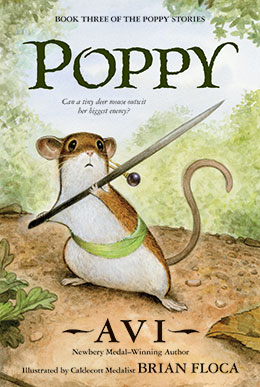 I recently received this letter:
I recently received this letter:
“I am a second-grade teacher at [xxxx], in the [xxxx] District. With the Covid pandemic taking a toll on education globally, it is with great pride that my class and I have taken a strong love and appreciation for Avi, and his series Poppy.
It all started as a read-aloud to second grade. I was nervous as a teacher because the pandemic really held students back in terms of their levels of expectations and academic preparedness. I made a teacher’s guide [for my] second graders [for a] read-aloud and chose Poppy.
The connection that I have with my students through this story is nothing short of amazing. I went from zero class participation to every single hand raised! That gives me chills! My students are so engrossed in Poppy and want to continue the series so badly, that is there is any way at all, that Avi could have a Skype session with us, we would be most gracious.”
Poppy was published in 1995, which means it has been around for twenty-five years. Over the years it has been very successful, more often than not (readers tell me) as a read-aloud. As you might guess, letters such as the one above—only recently received—are very gratifying. And while I have very clear memories of writing the book, I can tell you nothing meaningful about how I wrote it.
“How did you come up with the story?”
“How did you invent the characters?”
“How did you come up with the character named Ereth and his way of speaking?”
These are some of the questions I’m often asked about Poppy. The truth of the matter is that I cannot answer them. I wish I could. I can only say that once I wrote Poppy, I came to be enamored of these creatures as if they were entities quite separate from me. Indeed, I’ve written so many books about them mostly because I enjoy being with them. Lucky me. But I cannot explain how they came to be.
I think the truth of the matter is that a good deal of successful writing is often quite unconscious and intuitive. Speaking only for myself, my process of writing is essentially rewriting. By going over and over the book I am making constant changes, which is another way of saying I’m forever (so it seems) defining and redefining the characters and what they do, forever learning who and what they are. I’m constantly reminded of Robert Frost’s brave notion (often quoted here) “If there are no surprises for the writer there are no surprises for the reader.”
A case in point: I recently finished a book, but the specific ending of the story—the protagonist’s final actions—eluded me. I undertook many revisions. Many endings. And then, after a year of working on the text, I suddenly realized what that ending should be based upon yet another slog through the whole book. The clues—so to speak—for the final act were right there in the book along.
I know writers who meticulously work out the entire storyline. More power to them. It’s not my way. Yesterday I started a new book. I wonder what will happen. Something will. Just don’t ask me how I got there.
3 thoughts on “How I Got There”
I am so glad you are a writer. And I loved creating stories (not published or publishable) along with my students when I wrote what they were assigned or for writing time. The idea of the storyline and outline was foreign to my brain. So I am glad that you shared this process. Each to their own and thrilled you are still creating.
Inspiring to read your thought s/process.
Aloha, kila Hi! Avi & Linda!
Question: Is the writer’s life lonely?